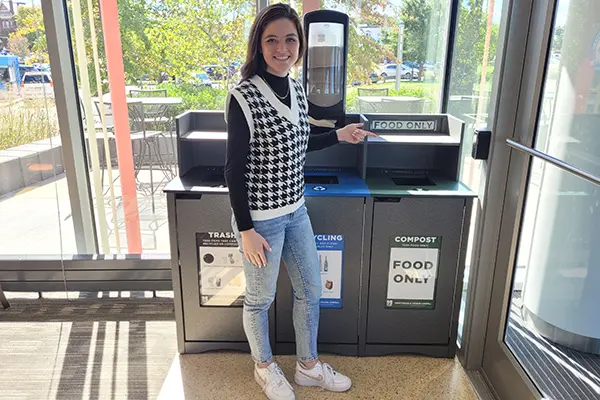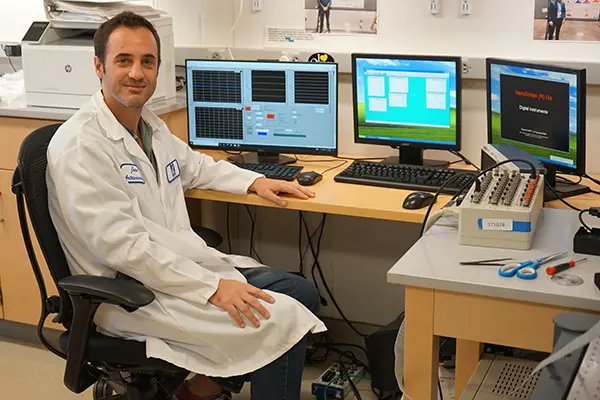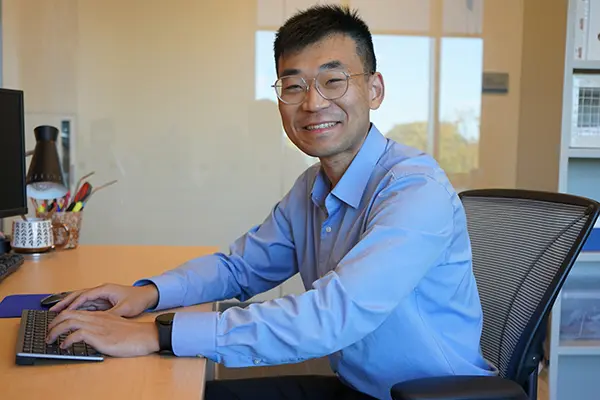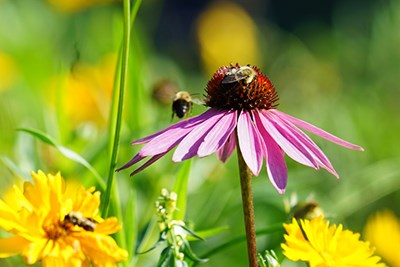Rist Institute for Sustainability and Energy Awards Funding to Faculty, Students
 Image by Brooke Coupal
Image by Brooke Coupal
09/29/2022
By Brooke Coupal
Plastics engineering major Abby Mastromonaco wants to expand on the composting efforts of UMass Lowell, which already composts food waste in all dining locations.
Her goal is to get compost bins that accept food waste and compostable plastics in each residence hall and in central locations on North and South campuses.
“I learned about compostable plastics in my plastics sustainability class, and I thought it would be a great addition to campus if we had more composting bins, including ones that you can put plastic in,” says the sophomore from North Andover, Massachusetts.
The Rist Institute for Sustainability and Energy (RISE) is helping Mastromonaco with her initiative through its Fellowship Program, which supports faculty and students interested in pursuing sustainability-related research, education or engagement projects.
Mastromonaco received a $5,000 undergraduate fellowship for her project.
“The RISE Fellowship Program is a great opportunity for me to bring my idea to life,” she says. “This will help me afford the composting bins and also create educational posters so people know what they can compost.”
Chemistry Asst. Prof. Juan Artes Vivancos was awarded a $15,000 faculty fellowship from RISE to create a new undergraduate course, Chemistry and the Data of the Climate Crisis.
 Image by Brooke Coupal
Image by Brooke Coupal
In this course, students will link basic chemistry concepts to climate change. For instance, they will learn the chemical structure of greenhouse gases and why those gases create a warming effect.
The course will also feature critical-thinking activities that include examining recent news articles about climate change and brainstorming solutions to combat the crisis.
“I want to get them thinking about what can be done to fight climate change from a chemistry standpoint and a personal standpoint,” says Artes Vivancos, who attended COP26, last year’s United Nations Climate Change Conference, as part of the delegation representing UML’s Climate Change Initiative.
Artes Vivancos envisions the course as a building block to creating a sustainable chemistry option for undergraduates.
“It’s one of the first steps of trying to get chemistry more into sustainability,” he says.
William Zhou, a fourth-year Ph.D. student in entrepreneurship from Nanjing, China, received a $12,000 graduate fellowship for his research study, which will look into how a company’s transition to a more sustainable way of doing business, known as the corporate green transition, affects its innovation.
“There has been a lot of research about sustainability in engineering and science, but research on sustainability in management and business is lagging behind,” says Zhou, who is also an adjunct faculty member for the Manning School of Business. “I believe there is a lot to explore in this field.”
Zhou will study how the corporate green transition affects a company’s search for information about sustainable business practices.
 Image by Brooke Coupal
Image by Brooke Coupal
Zhou will additionally study how the corporate green transition influences the involvement of underrepresented groups in business operations.
“The research will offer important insights for managers and business practitioners,” he says. “It will help managers better understand the process of the corporate green transition and help them improve innovation performance after the transition.”
Ruairi O'Mahony, the executive director of RISE, is excited to see these fellowship projects take shape at UMass Lowell, which is the highest-rated campus in Massachusetts for sustainability, according to the Association for the Advancement of Sustainability in Higher Education.
“The fellowship program continues to spark new ideas and creativity amongst our students and faculty. Much like the Rist Institute itself, these projects take a multifaceted and interdisciplinary approach to contribute to UMass Lowell’s climate, energy and sustainability goals,” he says. “We look forward to working with each of the fellows to implement their project and further deepen the teaching, research and engagement resources available to all at the university.”




